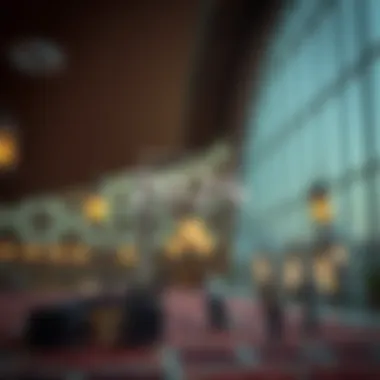Ramadan 2024 Timetable in the UAE: Key Dates and Insights


Intro
As the holy month of Ramadan approaches in 2024, people in the UAE begin to prepare for a spiritual journey steeped in centuries-old traditions. This period is not just about fasting from dawn until sunset; it encapsulates a community spirit that draws together families, friends, and neighbors. In the Emirates, the significance of Ramadan extends beyond personal reflection and piety, impacting various aspects of life including social gatherings, cultural nuances, and yes, even the real estate market in bustling Dubai.
This comprehensive overview focuses on the Ramadan timetable for 2024 in the UAE, providing essential information about fasting hours, prayer times, and significant cultural events. It reflects how this revered month touches daily routines while painting a picture of communal life in a place where traditions beautifully merge with modernity.
Moreover, the exploration delves into market insights, shedding light on how Ramadan influences real estate trends, shaping investment decisions and homeowner activities. Whether you are a resident, visitor, investor, or analyst, understanding the dynamics of Ramadan can greatly enhance your experience during this captivating month.
Prelims to Ramadan in the UAE
Ramadan in the United Arab Emirates is not merely a month of fasting; it is a deeply woven tapestry of cultural, spiritual, and social significance. The occasion is observed with heightened devotion across the diverse community of the UAE, which primarily consists of both Emirati citizens and a melting pot of expatriates. Understanding the nuances of Ramadan offers profound insights into the values and practices that define this holy month, facilitating a deeper connection for those who engage in its observance.
Significance of Ramadan
The importance of Ramadan extends far beyond abstaining from food and drink. It serves as a time for spiritual renewal, self-reflection, and intensified worship. Muslims believe that this month is a sacred period when the Quran was revealed to the Prophet Muhammad. Consequently, the Quran holds a place of honor in the daily routines of devotees during this time.
During Ramadan, individuals strive to improve themselves, focusing on charity, community bonding, and fostering empathy for the less fortunate. This transformative period encourages personal growth and interconnectedness; it reminds individuals to practice self-discipline and compassion. Regular prayers, increased recitation of the Quran, and charitable deeds are central to the month's rituals. As such, its significance resonates deeply, inspiring many to observe with sincerity and intention.
"Ramadan is not just about fasting; it’s about setting aside time for spiritual enhancement and reaching out to one another with kindness."
Unique Aspects of Ramadan in the UAE
In the UAE, Ramadan assumes a distinct flavor. The harmonious coexistence of various cultures greatly enriches the experience of this holy month. For instance, the widespread community spirit is palpable, with various events and public iftar gatherings open to all. Large iftar tents can be found across cities, where people from different walks of life come together to break their fast at sunset.
Moreover, the UAE's initiative to create a sense of belonging extends towards expatriates. Numerous events and festivals throughout the month showcase the diversity of cultures and traditions that make up the country’s demographic landscape. Whether it's through community service or open invitations to share meals, these unique aspects highlight how Ramadan fosters inclusivity.
In addition to cultural exchanges, the UAE’s remarkable skyline becomes a canvas of festive lights and decorations, creating an enchanting ambiance during this month. Cafés and restaurants often adjust their offerings to cater to the special needs of fasting individuals, presenting an array of traditional dishes and drinks, which symbolize generosity and hospitality.
Through these dimensions, Ramadan in the UAE is an all-encompassing experience; it interlaces spiritual obligations with festive celebrations, allowing for a unique blend of faith and culture that resonates with everyone, regardless of background.
Ramadan Dates and Timetable
Understanding the Ramadan 2024 Dates and Timetable is crucial for those living in the UAE, as it directly impacts their daily routines and spiritual practices. For Muslims, this holy month is a time of reflection, fasting, and community. The timetable serves as a necessary guide, ensuring that individuals can plan their days accordingly around fasting hours and prayers, all while maintaining a sense of spiritual commitment. Knowing these dates not only enhances personal devotion but also fosters a community spirit, as families and friends gather to break their fasts together.
Start and End Dates
In 2024, Ramadan is expected to begin on the evening of March 10 and conclude with the festival of Eid al-Fitr on the evening of April 9. These dates are subject to moon sighting, a traditional practice that marks the beginning of the Islamic month. Communities across the UAE will come together in mosques for announcements, where local authorities will declare the first day of fasting based on lunar visibility.
Being aware of the start and end dates helps individuals and businesses prepare ahead of time. For expatriates, understanding when Ramadan begins and ends ensures that cultural sensibilities are taken into account, allowing for respectful engagement with local customs.
Daily Fasting Times
Fasting is a core practice during Ramadan, and it involves abstaining from food, drink, and other physical needs from dawn until sunset. In 2024, the fasting times will vary slightly each day, but generally, individuals can expect to fast from approximately 5:00 AM to 6:25 PM. The exact times will be confirmed based on local prayer schedules.
These daily fasting hours provide both challenges and benefits. Following a strict timetable encourages discipline and enhances communal ties as people share meals during Iftar, the meal to break the fast, which usually begins right after sunset. In the warmer months, staying hydrated is crucial, and understanding the fasting hours allows people to plan more effectively for their nutrient intake during the non-fasting hours.
Prayer Times During Ramadan
During Ramadan, Muslims perform five daily prayers, with an additional emphasis on special prayers known as Taraweeh. These prayers occur after the obligatory night prayer (Isha) and involve the recitation of portions of the Quran over the course of the month.


The prayer times in the UAE follow the local Islamic calendar, which can fluctuate slightly based on the geographic location and the moon's position. On average, the prayer times during Ramadan 2024 will be:
- Fajr (Pre-dawn): 5:00 AM
- Dhuhr (Midday): 12:30 PM
- Asr (Afternoon): 4:00 PM
- Maghrib (Evening): 6:25 PM
- Isha (Night): 7:30 PM
"The prayers guide the daily rhythm of life during Ramadan, providing moments of reflection and connection within the community."
Adjusting to a new prayer schedule can be challenging for some, especially those who are new to Muslim practices. Thus, it's important to familiarize oneself with these times, as participating in the prayers can greatly enhance the spiritual experience of Ramadan.
Cultural Practices During Ramadan
Cultural practices during Ramadan in the UAE are more than mere rituals; they encapsulate the spirit and communal ethos that defines this holy month. People come together in ways that foster solidarity and deepen their bonds, making Ramadan a vibrant tapestry of cultural expression. Recognizing the cultural practices not only enriches the experience of observance but also provides insight into the diverse ways residents and visitors can integrate into this unique environment.
Iftar Customs
Iftar, the meal that breaks the fast each evening, is a significant part of Ramadan. Traditionally, it begins with the eating of dates and drinking of water, loving customs handed down through generations. In the UAE, the atmosphere during Iftar is electric. Families and friends gather at dining tables adorned with a variety of dishes that reflect the rich culinary diversity of the region.
Popular options include sambusas, harira, and shorbat adas. Open-air tents often pop up in parks and community centers, where large gatherings allow neighbors to share meals. Many people in the community donate meals to less fortunate families, reinforcing the spirit of giving.
One noteworthy practice is the celebration of Iftar at mosques, where local citizens and expatriates gather to share meals, transcending cultural boundaries. It’s a heartwarming sight, where conversations abound, and everyone comes together, regardless of origin.
"Iftar is an invitation to community and gratitude," remarks Fatima, a native of Dubai, emphasizing how these gatherings create a sense of belonging.
Suhoor Traditions
Unlike Iftar, Suhoor, the pre-dawn meal, is quieter but no less significant. This meal is crucial as it serves to fortify individuals for the day ahead in a country known for its high temperatures during Ramadan. Middle eastern dishes often grace the Suhoor table, with favorites such as foul medames and flatbreads taking center stage.
Hydration is essential during this pre-fast meal. Hence, drinks like milk, yogurt, and water are consumed in abundance. In many Emirati homes, it is customary to visit relatives for Suhoor, reinforcing family ties and community spirit. There’s an unwritten rule that every household will leave their door open for visitors, creating an inclusive and welcoming environment.
Community Gathering Events
During Ramadan, the UAE pulses with various community gathering events, reflecting the cultural richness of the society. From cultural exhibitions to charity bazaars, these events are designed with the essence of Ramadan in mind. Many communities organize charity drives, collecting not just funds but also necessities for those in need.
The Ramadan Night Market is one such event that has gained immense popularity. Local artisans, food vendors, and performers come together to celebrate the month through arts and crafts, live cooking demos, and traditional music. Additionally, the camel races during this month are another blend of cultural heritage and contemporary celebration, attracting both locals and tourists alike.
In urban areas, you will find many mosques hosting lectures and workshops aimed at deepening the understanding of Ramadan’s significance. These types of community events facilitate interaction among diverse cultures, making the observance of fasting and prayer a shared and enriching experience.
By participating in these customs and events during Ramadan, individuals not only deepen their understanding of the cultural essence of the UAE but also contribute to the sense of community that thrives throughout this month.
Impact of Ramadan on Daily Life
The holy month of Ramadan casts a profound influence on daily activities across the UAE. From changes in business operations to adjustments in school schedules, the rhythm of life adapts to respect the spiritual significance of the month. Not only do these shifts cater to the needs of those fasting, but they also foster a sense of community and shared understanding among residents and visitors alike.
Changes in Business Hours
In the UAE, businesses typically adjust their hours during Ramadan. Most offices shorten their workdays, often operating from around 9 AM to 3 PM instead of the usual hours. This shift is aimed at allowing employees to manage their fasting more comfortably and accommodate the myriad of activities associated with the month, especially iftar gatherings in the evenings.
- Retail Locations: Supermarkets and malls often extend their evening hours post-iftar to cater to shoppers looking to break their fast and gather supplies for meals.
- Restaurants: Many eateries offer special iftar menus starting at sunset, designed to bring families and friends together over the meal that breaks the fast.
This cultural shift reflects an understanding and respect for the fasting community, which aims to ease the burden of daily routines during this spiritually enlightening period.
School Schedules


Education is not immune to the effects of Ramadan either. Most schools modify their schedules to accommodate students' needs during the month. Many institutions start classes later in the morning and conclude earlier in the afternoon. This adjustment aims to promote a conducive learning environment, especially for those students who are fasting.
- Morning Sessions: Schools may begin at around 9 AM, offering students adequate time to prepare for their day without the rush.
- Flexible Activities: Extracurricular activities may be limited or adjusted in timing, ensuring students can partake in their religious observances without undue stress.
Overall, these changes are not merely logistical; they symbolize a collective respect for the values of Ramadan, emphasizing patience, community, and faith.
"Ramadan is a period of immense growth, not just spiritually but socially, as people come together, share meals, and lend support to one another through adjustments in their daily lives."
In summary, Ramadan's impact on daily life in the UAE is multifaceted, covering business practices and educational environments. These adaptations showcase a unique cultural and spiritual fabric that contributes to the vibrant essence of this holy month.
The Real Estate Market During Ramadan
The real estate market in the UAE experiences unique fluctuations during Ramadan, making this period particularly important for investors, homeowners, and realtors. As a month of reflection, community, and charity, the habits and needs of residents shift dramatically. Understanding these shifts can empower stakeholders to make informed decisions and seize emerging opportunities.
Trends in Property Rental
During Ramadan, the trends in property rental often see noticeable changes. Many landlords tend to adjust rental prices, particularly in areas with high foot traffic and proximity to mosques. With the influx of tourists and expatriates during this holy month, demand for short-term leases rises. Here are some key points to consider:
- Price Adjustments: Landlords might offer discounts or promotions in order to attract potential tenants during the month.
- Increased Demand: Areas known for their community activities, such as cultural events or gatherings, see an uptick in interest.
- Preference for Fully Furnished Units: Many renters prefer fully furnished properties that reduce the hassle of moving in and out quickly.
As the sunset approaches, the focus turns to Iftar gatherings, leading to higher demand for properties equipped for entertaining. Rental properties with additional amenities like outdoor spaces, pools, or communal areas are often sought after for breaking fast together.
Investor Behavior
The behaviors of investors during Ramadan also shift considerably. Many investors adopt a wait-and-see attitude, while others proactively take advantage of the unique market conditions. Key behavior patterns can include:
- Increased Research: Investors tend to conduct more thorough research on properties that are appealing to families seeking stability during Ramadan.
- Focus on Community-Oriented Developments: Properties situated in family-friendly neighborhoods and those with shared amenities like parks tend to attract more attention.
- Speculative Investments: Some may seek to invest in high-demand areas, anticipating a rise in rental rates post-Ramadan as life resumes its normal rhythm.
Understanding these new dynamics enables informed decision-making in an evolving marketplace. Also, investors pounce on opportunities that may arise amid the rush.
Impact on Sales and Listings
Sales activity during Ramadan often grinds to a slower pace, but this doesn't signal a market decline. Instead, it reflects the seasonality of the real estate cycle. As residents focus more on spirituality and community, property listings may see changes:
- Fewer Showings: Many agents report a decrease in property showings as potential buyers prioritize spiritual commitments and family gatherings.
- Delayed Transactions: Sales that begin during Ramadan may take longer to complete, as buyers take their time to reflect on major decisions.
- Market Confidence Boost: Nevertheless, there could be a spike in activity immediately following Ramadan as buyers return to the market with renewed vigor.
"Real estate transactions often hover in a lull during this month, only to bounce back with momentum as Ramadan concludes, resulting in a flurry of activity across property listings."
To navigate this tricky terrain, stakeholders could benefit from aligning their strategies with the unique rhythms of the holy month, ultimately resulting in a more fruitful endeavor in the dynamic UAE real estate market.
Health Considerations During Fasting
Fasting during Ramadan is not just a religious obligation; it's also a time that poses unique health challenges and benefits. Understanding health considerations during fasting is fundamental for those participating in this spiritual journey. It is essential to foster good habits that not only respect the traditions but also ensure one's well-being throughout the holy month.
Fasting can substantially change daily routine, often leading to various physical and mental adjustments. Outlining healthy practices is crucial for maintaining energy levels and avoiding fatigue.
Maintaining Hydration
As the sun rises and sets, the body undergoes significant shifts in hydration levels. Maintaining hydration is one of the most frequent concerns as fasting restricts water intake from dawn until sunset. Individuals can face dehydration, which can lead to dizziness, headaches, or reduced concentration.


To combat these, it is important to drink ample water during the non-fasting hours. Here are some effective strategies:
- Hydrate Gradually: Instead of chugging down water at iftar, aim for smaller, consistent sips. This allows better absorption and can stave off the feeling of fullness that comes from drinking too much too soon.
- Include Hydrating Foods: Foods such as cucumbers, watermelon, and oranges have high water content. Including these in suhoor can be beneficial.
- Limit Diuretics: Be cautious with drinks like coffee and tea. Though they may be enjoyable, they can increase the need for water.
In short, ensuring adequate hydration can promote overall health and enhance one's experience of Ramadan.
Nutritional Advice for Suhoor and Iftar
Nutritional planning for suhoor and iftar can make a world of difference in how one feels during the fast. What to eat is often a topic of discussion, as it holds the key to maintaining energy levels throughout the day. Here’s how to approach meals effectively:
- Opt for Balanced Meals: At suhoor, it is crucial to focus on a balance of carbohydrates, proteins, and fats to provide lasting energy. Foods such as oats, eggs, and yogurt can sustain energy release.
- Avoid Sugary Foods: While it might be tempting to reach for sweets at iftar, heavy sugar can lead to spikes and crashes in energy levels. Instead, consider healthier alternatives like dates, which provide instant energy and are rich in essential nutrients.
- Mind Portion Sizes: In the excitement of breaking the fast, overindulgence can happen easily. Eating more modestly can prevent discomfort. It is advisable to start with dates and water, allowing the stomach to adjust before delving into the main meal.
An effective approach to nutrition can set the tone for the day, ensuring individuals can engage fully in their activities, prayers, and community events.
Nutrition during Ramadan isn't just about fasting; it's a journey towards better health and spiritual elevation.
Social Responsibility and Charity
During Ramadan, the emphasis on social responsibility and charity becomes significantly pronounced in the UAE. This holy month is a time for Muslims to engage more deeply with their faith while participating in acts of compassion that can greatly influence community welfare. As the spirit of giving invigorates the society, it becomes crucial to navigate and comprehend its many facets and implications.
One notable tradition during Ramadan is the act of Zakat, a form of almsgiving which is one of the Five Pillars of Islam. This method allows Muslims to purify their wealth while uplifting those less fortunate. As individuals calculate their Zakat contributions, they not only fulfill a religious duty but also feel a profound sense of connection to the community. The funds raised through Zakat are channeled into various projects that aid the underserved, covering essentials like food, healthcare, and education.
Additionally, Ramadan encourages charitable giving beyond Zakat. Many families engage in acts of Sadaqah, which refers to voluntary charity, allowing them to provide for those in need at their discretion. This culture of generosity is particularly notable in the UAE, where expatriates and locals alike come together to support various causes. The idea is not just about giving away money but actively participating in the betterment of one's surroundings. A communal effort like organizing food drives, sponsoring iftars, or donating essential supplies exemplifies the power of unity in charity work.
"Charity does not diminish wealth; on the contrary, it multiplies it in unexpected ways."
In essence, the importance of social responsibility during Ramadan lies in its transformative potential. Contributing to charity helps build a closer-knit community, promoting social cohesion and understanding among diverse groups. By participating in charitable acts, people feel they are making a tangible difference. This mutual support creates a sense of belonging that persists long after Ramadan ends.
Importance of Zakat
Planning for Zakat during Ramadan is vital for many individuals. It generally amounts to 2.5% of one's accumulated wealth and must be given to those in need. This act is not merely a financial transaction but a dedication to community welfare. Notably, the UAE has implemented digital platforms to facilitate the process of paying Zakat, removing barriers and ensuring more people can contribute with ease. As more individuals engage in this practice, the reach and effectiveness of charity are magnified.
The funds collected through Zakat are crucial for various local charities and initiatives. Many non-profit organizations strategize their campaigns to maximize support during Ramadan since people are more inclined to give at this time. In this way, Zakat serves as a foundational element in addressing the broader social issues, aiding those in immediate need while fostering longer-term solutions to poverty and disenfranchisement.
Volunteering Opportunities
Aside from monetary contributions, volunteering one's time and skills can have a profound impact during Ramadan. Many organizations in the UAE create opportunities for citizens and residents to get involved in community service. Initiatives include distributing food to the needy during iftar, organizing health drives, and even mentoring programs for youth.
Getting involved not only meets the immediate needs of the community but also enriches the volunteer's experience. Many volunteers express that working together for a common cause creates strong bonds and shared memories that significantly enhance the community spirit. Furthermore, it serves as a reminder of one's own privileges, fostering a mindset of gratitude.
Some local charities, such as the Emirates Red Crescent, frequently call for volunteers during this month. These organizations often create events like community dinners or health walks that hinge upon the contributions of enthusiastic volunteers eager to make a difference.
In summary, social responsibility and charity during Ramadan help shape the character of the UAE's society. Zakat and volunteering opportunities create moments of reflection and community building. By understanding and engaging with these elements, individuals may not only contribute to the upliftment of others but also find a deeper essence of their faith and society.
Finale
As Ramadan unfolds in 2024, understanding its essence and timeline becomes paramount, especially for those residing or visiting the UAE. The significance of this holy month stretches far beyond mere fasting; it embodies a profound transformation in societal rhythms and personal reflections.
Reflecting on Ramadan's Impact
During Ramadan, the pulse of the UAE shifts dramatically. Individuals engage in self-reflection, and this collective introspection fosters a spirit of community. As people focus on their spirituality, they also strengthen bonds with family, friends, and neighbors.
- Community Engagement: Many find themselves participating in local events and charity initiatives. These gatherings not only nourish the body through shared meals but also enrich the soul.
- Social Dynamics: Businesses adapt to accommodate the changing social landscape, and this adaptation can reshape interactions in workplaces and neighborhoods.
- Real Estate Considerations: Investors and homeowners should be aware of the shifts in market behavior that align with Ramadan. As housing demand could fluctuate, understanding community needs during this period is vital.
Recognizing these impacts helps individuals navigate their daily lives with empathy and awareness. The rich tapestry of traditions woven throughout the community serves to remind us of the values of generosity, compassion, and unity.
Overall, Ramadan 2024 provides an opportunity to foster greater understanding and connection within the UAE, blending cultural diversity with shared values. It’s not just about the holy month itself but the lessons it imparts long after the fasting period concludes.





